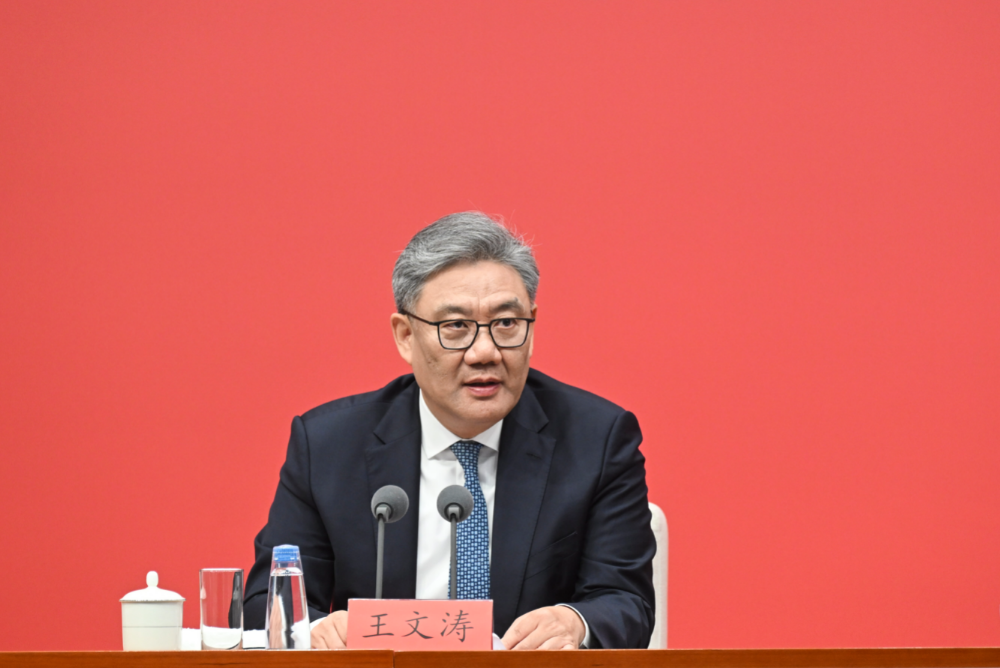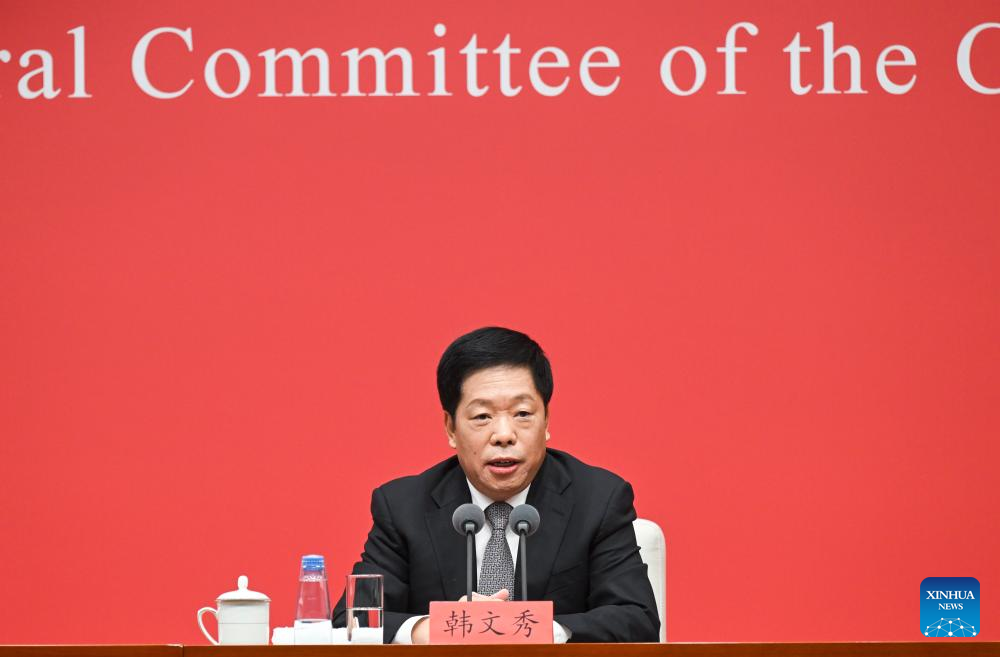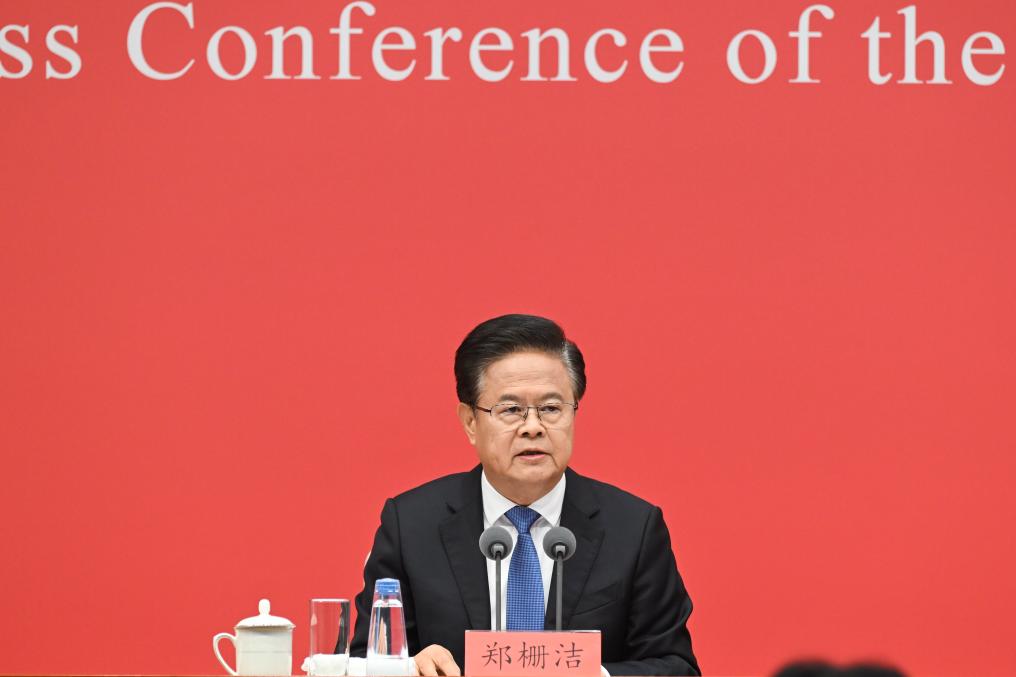
BEIJING - China will take the initiative to open wider in the 15th Five-Year Plan period, China's Commerce Minister Wang Wentao said Friday.
Focusing on the service sector, efforts will be made to expand market access and areas of openness from 2026 to 2030, Wang told a press conference, citing the Recommendations of the Central Committee of the Communist Party of China (CPC) for Formulating the 15th Five-Year Plan for Economic and Social Development, which was adopted by the fourth plenary session of the 20th CPC Central Committee that was convened in Beijing from Monday to Thursday.
Han made the remarks at a press conference held by the CPC Central Committee on the guiding principles from the session.
Participants at the session deliberated over and adopted the Recommendations of the CPC Central Committee for Formulating the 15th Five-Year Plan for Economic and Social Development, according to a communique of the session released on Thursday.
The country will expand pilot programs to open up in value-added telecommunications, biotechnology, and wholly foreign-owned hospitals, while increasing openness in the education and cultural sectors in an orderly manner, Wang said.
China will accelerate the advancement of regional and bilateral trade and investment agreements and expand its network of high-standard free trade zones, Wang added.
ALSO READ: CPC Central Committee to hold press conference on plenary session
Regarding trade, China plans to enhance trade in intermediate goods and green trade, improve the management system for the negative list for cross-border services trade, and steadily increase openness in digital trade, according to Wang.
China will also intensify efforts to increase imports to meet the needs of industrial transformation and upgrading, as well as the people's demand for a better life, Wang said.
To create new advantages in attracting foreign investment, China will foster a transparent, stable, and predictable institutional environment, he said.
"We will accelerate the development of new quality productive forces, promote the growth of industries such as artificial intelligence (AI), biotechnology, and new energy, and turn China's vast market into a global testing ground, application hub, and profit center for innovation," Wang said.
Stressing that the Belt and Road Initiative is not a "solo performance" but a "chorus," Wang said China will deepen pragmatic cooperation with related countries in trade, investment, industry, and cultural exchanges, while expanding collaboration in green development, digital economy, and AI.
"Moving forward, whether it is opening up or attracting investment, we will avoid zero-sum approaches that harm others for personal gain," Wang said. "Instead, we will focus on mutually beneficial and shared development."

Major development objectives for 2026-2030 period
At the same press conference, Han Wenxiu, executive deputy director of the Office of the Central Committee for Financial and Economic Affairs, said the recommendations of the Central Committee of the CPC for formulating the 15th Five-Year Plan outline the major objectives for economic and social development mainly in seven areas.
According to Han, the major objectives are to make significant achievements in high-quality development; substantial improvements in scientific and technological self-reliance and strength; fresh breakthroughs in further deepening reform comprehensively; notable cultural and ethical progress across society; further improvements in quality of life; major new strides in advancing the Beautiful China Initiative; and further advances in strengthening the national security shield.

Building modernized industrial system
At the same press conference, Zheng Shanjie, head of the National Development and Reform Commission, said the recommendations of the CPC for the 15th Five-Year Plan have made it a top priority to build a modernized industrial system and reinforce the foundations of the real economy.
To achieve the target, efforts will be made to upgrade traditional industries, cultivate and expand emerging and future industries, promote the high-quality development of the service sector, and build a modernized infrastructure system, Zheng said.
The recommendations have outlined that China will promote the upgrades of key industries, consolidate the international competitiveness of sectors such as chemicals, machinery, and shipbuilding, and develop advanced manufacturing clusters, Zheng said.
Efforts will also be made to accelerate the development of strategic and emerging industry clusters, including new energy, new materials, aerospace, and low-altitude economy, and to foster future industries, such as quantum technology, biomanufacturing, hydrogen energy and fusion energy, brain-computer interfaces, embodied intelligence, and sixth-generation mobile communications.
These industries are poised for significant growth, with the new scale added over the next decade equivalent to creating a whole new high-tech sector in China, thereby injecting continuous momentum into the high-quality development of the country's economy, Zheng said.
Raising average life expectancy to 80 years
Meanwhile, China aims to raise the average life expectancy of its people to around 80 years through efforts in the five-year period from 2026 to 2030, according to Lei Haichao, head of the National Health Commission.
By the end of 2024, the average life expectancy of the Chinese has reached 79 years - an extraordinary achievement among developing countries, said Lei.
According to Lei, China has established the world's largest health service system, disease prevention and control system, and medical insurance system over the past five years, marking remarkable progress in the country's healthcare and population development.
China has also weathered the once-in-a-century pandemic, and continuously improved its people's average life expectancy during the 14th Five-Year Plan period (2021-2025), the official said.
"Based on the international development trend, the comprehensive national strength and work foundation of China, we hope to raise the average life expectancy of the Chinese population by one year in five years," the official added.


